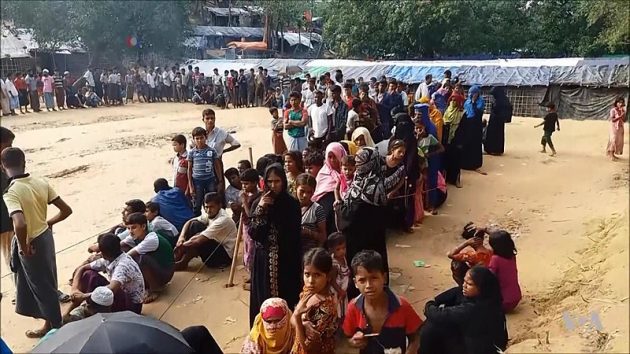
Dispatch from a refugee camp during the COVID-19 pandemic
by Petra Molnar, Associate Director, Refugee Law Lab, York University, Canada and Kenya-Jade Pinto, Filmmaker in Residence, Refugee Law Lab, York University, Canada
COVID-19 is an afterthought at most refugee camps

Rohingya refugees in refugee camp in Bangladesh, 2017 PHOTO: Zlatica Hoke/ Wikimedia Commons
When the COVID-19 pandemic first appeared, and we were preoccupied with bread-baking and Tiger King, it was talked about as the great equalizer, a moment to bring us all together.
Yet as we enter the eighth month of this global crisis, it becomes increasingly clear that we’re hardly “in this together.”
We recently returned from the island of Lesbos, the site of the latest tragedy within European borders — the burning of the Moria refugee camp. We witnessed thousands of people being sequestered on a barren stretch of road without food or water, tear-gassed and then herded into a new camp hastily built on the grounds of an old shooting range on a windswept peninsula.
We entered the camp with a group of journalists and saw first-hand the woefully inadequate living conditions, as well as a barbed-wire facility keeping suspected COVID-19 cases apart from everyone else.
If anything, COVID-19 was an afterthought at the camp. When your baby is sleeping on a flattened cardboard box and you have not had water for days, a global pandemic is a distant threat that pales in comparison to the everyday violence that is omnipresent. Yet there was a spectre of fear around the increasing COVID-19 numbers. It’s a threat that is impossible to combat when you have nowhere to wash your hands.
COVID-19 weaponized
We grappled with the ethics of travelling during a global pandemic. But because one of us is currently based in Athens and working on a long-term project documenting migration and surveillance technologies, we felt it was imperative to witness the building of a new detention facility that will serve as a testing ground for new technological interventions.
Already, the COVID-19 pandemic has been weaponized to justify increasing surveillance mechanisms, leading to potentially far-reaching human rights abuses for communities on the margins.
Just recently, Frontex, Europe’s border-monitoring agency, announced that it was piloting a new aerostat maritime surveillance system, using Greece as a testing ground.
The European Commission’s new Migration Pact reveals the European Union’s staunch refusal to stop criminalizing migration, its empowerment of Frontex, its insistence on locking people in far-away frontier camps and its failure to redistribute responsibility for migrants among EU member states.
We also witnessed the inaction of the international community during our time on Lesbos.
While local preoccupations with spiking COVID-19 numbers are understandable, and as existential fatigue sets as the pandemic endures, it’s telling that the pandemic is just one of the many layers that are making 2020 a very difficult year for so many migrants and refugees.
Lost in nameless photos, numbers
The stories of individual lives can get lost in nameless photos and numbers when reporting on international crisis of mammoth proportions. Yet many Canadians may have deep connections to the people still detained on Lesbos, particularly because more than 40,000 Syrian friends, neighbours and family members were resettled to Canada in 2015-16. Many of the people in Lesbos are Syrian.
Just imagine how terrifying it would be to be detained in bunk beds with strangers and no running water, monitored by an omnipresent government, with nowhere to wash, bathe or properly disinfect amid a pandemic that’s killed more than a million people — and stuck in a violent migration system for years with no end in sight.
COVID-19 is one of the many intractable and overwhelming problems facing the world today that can be overwhelming to contemplate. However, understanding how the pandemic is experienced around the world will bring us closer to the otherwise empty sentiment of “we’re all in this together.”
Looking beyond our own frame of reference allows us the opportunity to consider the deep connections among us all, tied together by the same virulent disease, a once-in-a-lifetime experience highlighting just how much we owe to each other as members of the global community.
It’s becoming evident that things can and likely will get worse before they get better in refugee camps around the world.
While the answers are yet to be found, we must continue to ask the question: What does it mean to be in this ordeal together, when barbed wire, digital borders and policies that turn places of refuge into prisons keep us apart?![]()
This article is republished from The Conversation under a Creative Commons license. Read the original article.